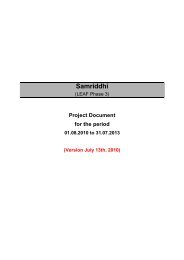BUSINESS DEVELOPMENT SERVICE ASSESSMENT REPORT
BUSINESS DEVELOPMENT SERVICE ASSESSMENT REPORT
BUSINESS DEVELOPMENT SERVICE ASSESSMENT REPORT
You also want an ePaper? Increase the reach of your titles
YUMPU automatically turns print PDFs into web optimized ePapers that Google loves.
company uses local laboratory for hygienic testing. For export meat,<br />
there are some basic requirements such as compliance of standards<br />
in slaughter process, hygiene testing before slaughter and cutting<br />
carcasses into pieces. The company procures meat between August<br />
and November every year and its representatives travel to herder<br />
gers to buy directly from herders. Its procurement totals 2,000 horses,<br />
2,000 cattle, and 10,000 small ruminants through direct procurement<br />
or through representatives working in the soums. There are cases<br />
that herders also bring their animals to company for sale. The<br />
company buys cattle and horses mainly from Undurhangai, Zuungobi,<br />
Zuunhangai and Tes soums and buy small ruminants directly from<br />
changers or representatives in all soums. Company selects the area<br />
where to buy animals based on information disseminated by Aimag<br />
Agricultural Department on spread of communicable animal diseases,<br />
with its main requirement of buying live animals with meat yield of no<br />
less than 18 kilograms. Due to some reason, the company has to buy<br />
animals with meat yield of 12-20 kilograms, sometimes. There are<br />
seldom cases that animals do not meet requirements. The company<br />
is interested in buying effective from June, but the only possibility is<br />
that herders start selling in August.<br />
The company also has a capacity of producing a tonne of sausage<br />
per month (30-5 kg a day). Further renovation is required for<br />
processing of by-products like head and legs. The company is<br />
planning to process about 1000 sheep heads as a pilot project. For<br />
sausage making business, company invited an expert from Russia<br />
paying 55USD per diem and 6000 USD salary for two months. Under<br />
the contract with Ulaangom college, company will have students<br />
working as an apprentice between December to April some will be<br />
employed. Totally the company employs about 40 people.<br />
For the meat procurement, the company gets down payment from<br />
Russian counterparts as well as get 150 million MNT loan from Khan<br />
Bank with 1.3% of interest per month.<br />
8. Raw material changers - Dorjderem<br />
Local changers procure cashmere worth 3.1 billion MNT per year and<br />
sell to Goyo company, one of the biggest cashmere producers. As<br />
there is no need to sort cashmere, changers mix Ulgii red goat<br />
cashmere (fine cashmere) with Bayan-Ulgii black goat coarse<br />
cashmere. Aside from cashmere they also buy and sell 300 million<br />
MNT skin and hide to UB, from there sold to China. They also sell<br />
over 100 tones of meat to Russia (about 200 million MNT). Compared<br />
to large processing company, they buy animals for longer period<br />
November to January. They also have their own storage houses in<br />
where a Russian appointed veterinarian comes and checks for the<br />
quality. Jast company also buys meat for state reserve so changers<br />
sometimes provide the company with 100-150 tones of meat if the<br />
price that Jast offers suits them. Sometimes herders also come to sell<br />
animals, so the company does not have to travel to countryside for<br />
buying animals.

















